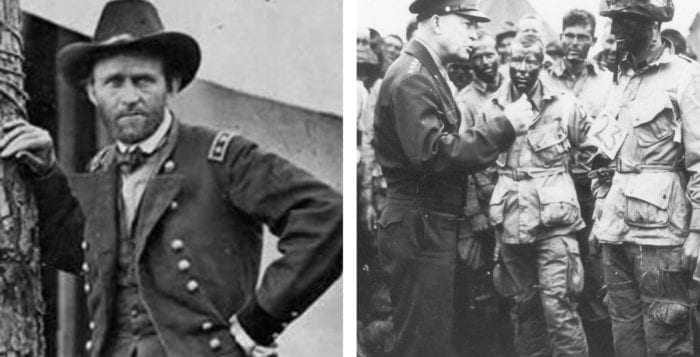By Rich Acritelli
“The mission of this Allied Force was fulfilled at 0241, local time, May 7, 1945.”
It was at this moment 72 years ago that General Dwight Eisenhower flashed the victory sign to the free people of the world to signal the end of World War II against the Nazis in Europe. During the war, he was often criticized by other American generals as being too “pro-British,” or by the English as not having enough experience to run the war effort. But it was Eisenhower who was credited for seeing the big picture of the war effort to put aside the military differences of the British and Americans to achieve victory.
Some 152 years ago, General Ulysses S. Grant proudly watched his army completely defeat the Confederacy. Almost a year after President Abraham Lincoln made him the commanding general of all Union armies, he was at the cusp of a monumental victory. Grant was often criticized as a “butcher” who accepted extreme losses under his command, but he wrote a letter to Robert E. Lee expressing the need for his army to surrender. Grant told his adversary that all was lost and that peace must be restored to the divided nation. At Appomattox Court House, Grant offered Lee generous terms to prevent any further loss of life, to the surprise of the enemy. When northern artillery guns opened fire to celebrate the victory, Grant ordered them to stop because the Confederates were countrymen of the Union.
There are many similarities between Eisenhower and Grant. Both men were born in the Midwest — Eisenhower was from Kansas and Grant from Ohio. They both utilized West Point to leave a small town. Eisenhower was an outstanding football and baseball player. Grant was a superior horseman, who made one of the highest jumps ever recorded at the academy. They were both well-liked by their peers, as Eisenhower flashed a well-known grin and it was said at West Point, if you had a problem, Grant was seen as the fairest cadet to find a solution.
By the start of their respective wars, both men had not reached their professional goals. Grant earlier resigned his commission and he was later forced to work at his family store as a clerk in Galena, Illinois amid speculation about issues with alcohol. His first job for the Civil War was mustering soldiers into service for the Illinois government. Eisenhower always believed that he was cursed for not serving in France during World War I and he expected to retire as a colonel. But their senior officers and government officials found that these men could be counted on to carry out their military responsibilities.
These two officers were different politically than their commanders in chief. Grant voted as a Democrat before the war, but he openly wept at Lincoln’s funeral. Eisenhower was a Republican who did not support the New Deal. Perhaps due to the immense expectations that were placed on them, Eisenhower smoked five packs of cigarettes a day and Grant was believed to puff on thousands of cigars from 1861 to 1865.
Both men were known for their calm demeanors. During the Wilderness Campaign in 1864, Grant told his officers to stop thinking about the exploits of Lee and for them to create plans to hurt the southerners. At the height of Hitler’s failed attempt to overcome the Allies during the Battle of the Bulge, Eisenhower reorganized his armies and told his commanding generals that he expected to see only positive faces. He understood that the enemy had come out of their fortifications and they were now in the open where they could be destroyed.
At the end of the war, Grant was concerned that Lee would move his army into the Appalachian Mountains where his men would conduct guerilla operations. Eisenhower had no interest in attacking Berlin. He refused to take a city that would have to be partially given back to the Soviet Union. Instead, he pushed his army southeast towards Austria, Czechoslovakia, and the Alps. Like Grant, he did not want any German forces prolonging the war in the mountains. Eisenhower and Grant were both from regular backgrounds. They evolved into two epic military figures in American history, and they were only interested in successfully carrying out their duties for the nation.
Rich Acritelli is a social studies teacher at Rocky Point High School and an adjunct professor of American history at Suffolk County Community College. Research for this story was contributed by the Rocky Point High School History Honor Society.





